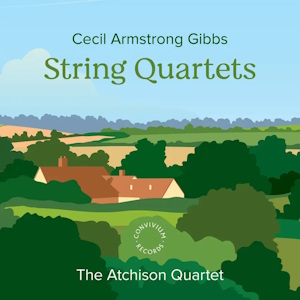
Cecil Armstrong Gibbs (1889-1960)
String Quartet in C, Op.95 (1940)
String Quartet in A minor, Op.8 (1917)
Three Pieces for String Quartet (1927)
String Quartet in E minor (1958)
A Birthday Greeting for Ralph Vaughan Williams (1942)
Atchison Quartet
rec. 2022, St George’s Headstone, Harrow, London
Convivium CR083 [66]
This selection of Armstrong Gibbs’ String Quartets doesn’t include Op.73 which was recorded by the Griller Quartet as long ago as 1933. Gibbs is best-known as a composer of song and for his lighter orchestral music, which is bright and charming, but like most British composers of the time he saw that there was a market for chamber works and particularly Cobbett-era quartets. In later years he seems to have used the quartet as a medium of personal reflection.
Gibbs is an awfully agreeable composer but never especially distinctive. The Op.95 Quartet was composed in 1940 and has those elements of flexibility and some folkloric infusions that generate creative contrasts. He also has a yen for antique-sounding cadences. The finale has an extensive pizzicato workout, the delight of which tends to pall through its overuse. Nevertheless, it sums up his compact, very English qualities – a pastel etching of limited ambition.
There’s nothing wrong with limited ambition, of course, it that’s your compositional modus vivendi. The much earlier 1917 Quartet, Op.8 offers a similarly three-movement form – it was the form he favoured – and classical virtues. Gibbs liked Tudor-Elizabethan cadences, something that he perhaps absorbed from his friend Vaughan Williams, and there are examples of that element here. Lyricism is free, notably in the central slow movement, and the pensive start of the finale is dissipated by a vigorous Allegro vivace. The quartet had the good fortune to be dedicated to, and premièred by, the leading British ensemble of the time, the London String Quartet.
Each of the Three Pieces (1927) carry topographical descriptions and these compressed watercolours – scenic portraits – evoke Blea Tarn, Winster Valley and Loweswater which are all in the Lake District. The central panel is the most urgent and Gibbs ends with an ‘all passion spent’ portrait of Loweswater called ‘Calm after Storm’. All very painterly. In 1942 he wrote A Birthday Greeting for Ralph Vaughan Williams, a rather folksong-like affair with a penchant for the vocal. It only lasts two minutes and VW received it graciously.
This leaves the Quartet in E minor composed in 1958, two years before his death. Both his wife and VW had recently died and this final quartet seems more of an inner journey than a public one, as the notes suggest. Gibbs is never, or very seldom, one to inflict jarring expression on his listeners preferring a more circumscribed landscape in which, as here, moments of heightening and increased intensity stand out for their unusual gravity. Again, there is a Tudor infiltration, perhaps as a final gesture to VW, in the Variations with which the work ends, which also contains a brief reminiscence of Warlock’s Capriol Suite, not inappropriately in its own biting nostalgia. For me the best moments are in the evocation of consort sonorities in this final movement – finely done by the Atchison Quartet – as the work ends in frank though not showy melancholy.
Gibbs is the John Sell Cotman of British composers; always equable, precise, hinting at the antique in places, but a beautiful watercolourist nonetheless. If you’re looking for angst, you’ll need someone else. The Atchison Quartet play these works with awareness of his circumscribed ambition and have been well recorded. Nicholas Riddle mounts a good defence of his music in the notes.
Jonathan Woolf
Previous review: Nick Barnard (November 2023)
Help us financially by purchasing from



















